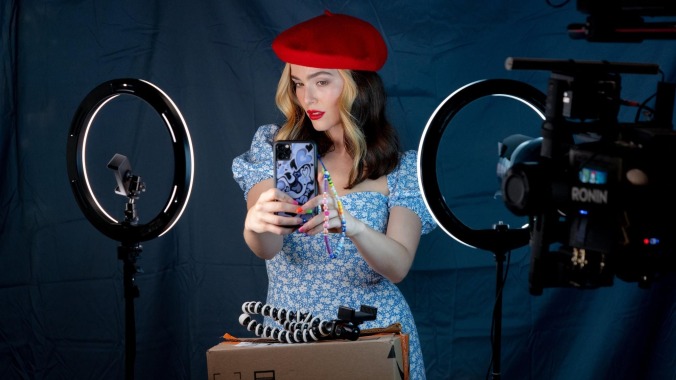In Not Okay, Zoey Deutch dazzles as a privileged liar who falls from Internet grace
Writer-director Quinn Shephard delivers a perceptive satire on influencer-driven social media, digital fame and so-called cancel culture

As far as antiheroines go, Not Okay’s satirical main character Danni Sanders (an aptly caustic Zoey Deutch) has few redeeming qualities. Indeed, despite Deutch’s undeniable charisma and effortless allure, Danni just feels unlikable, mostly because she seems completely unbothered by how tone-deaf she is when it comes to, well, everything.
But in the carefully woven, zippily edited, and largely entertaining world that young, insightful writer-director Quinn Shephard builds for Danni—one that open-endedly reflects on social media, influencer fandom, internet fame, and the so-called “cancel culture” that holds wrongdoers accountable for their misdeeds, perhaps a little too severely at times—that tone-deafness is a branding exercise to Danni. “Lena Dunham does it,” is how she defends her frequent inability to read the room and unpublishable pitches to her online magazine’s editor, the latest of which is cringingly titled, “Why am I so sad?”
But Danni is no Dunham. In fact, she is barely a writer—she’s a gifted photo editor dreaming to be published with a real byline one day, though the premise of her aforementioned article indicates she might not get to live her dream anytime soon. (Danni thinks “living in Bushwick, Brooklyn” and “missing 9/11 while on a cruise” are legitimate reasons to be sad, that others would want to read.) It’s easy to accuse Danni of being a privileged and entitled white woman, but these factual labels don’t touch on her biggest offenses.
What Danni is guilty of more than anything is a general sense of indifference. In other words, she is far from clueless, she just doesn’t care about anything. Still, is she deserving of all the widely publicized hatred she receives in the swift opening montage of the film, in which people call her “dumbass,” “bitch,” “inhuman,” and even “worse than Hitler” on social media?
You be the judge, says Shephard, as she flashes back to a few weeks earlier when Danni was a friendless loner with a cute guinea pig pet and zero Instagram clout to speak of, desperate to impress her office crush, a grating influencer-type named Colin (Dylan O’Brien). And what’s an invisible yet nonchalant girl to do to get her heart’s desires, if not lie liberally? Making up a seemingly harmless story to her colleagues and family, Danni one day claims that she is invited to a reputable writers’ retreat in Paris. Fake selfies in berets, shots of French pastries, and lots of make-believe backdrops soon populate her Instagram account, whose follower count quickly grows.
But Danni’s online bliss doesn’t last long. When coordinated terrorist attacks erupt in real-life Paris, she decides to double down on her lie—playing the part of a bombing survivor, and even publishing an inspirational piece that launches the shockingly popular hashtag, #ImNotOkay. Overnight, Danni secures the attention and goodwill of strangers she’d always wanted. But at what cost?
Actor-filmmaker Shephard was barely 21 when she wrote and directed her fierce and excellent feature debut, Blame (2017), a modern take on Arthur Miller’s The Crucible that used a high school rivalry to interrogate hefty concepts like sexual boundaries, truth, and fairness. Watching Not Okay is like watching this remarkable young talent grow up in real time, as she explores her preoccupations and anxieties on a much larger canvas (and clearly, a bigger budget), echoing films like Dear Evan Hansen and even Can’t Buy Me Love where awkward lies snowball to disastrous effect. Too smart to blindly villainize Danni or absolve her from her irresponsible acts, Shephard instead aims to probe her type here, trying to weigh often unanswerable questions about flawed people doing and saying careless, even awful things in an era where rightful anger can explode to punishing extremes.
In Danni’s case, what propels her popularity (and therefore, the severity of her eventual fall from grace) is an unlikely friendship she strikes with the young Rowan (a fiery Mia Isaac), a school-shooting survivor who turned her unspeakable trauma into heroic activism, like the survivors of the Parkland, Florida, shooting. The two attend support groups, hang out on weekends and help each other with genuine sisterly compassion. Both Deutch and Isaac are terrific in selling this tricky chemistry; the former quietly emanating an increasing sense of remorse (with some help from Shephard’s clever camera that accentuates Danni’s growing reprehension), and the latter relaxing into a dynamic she was formerly skeptical of.
Since we already know from the opening sequence that this tale won’t have a happy ending, it wouldn’t be a spoiler to reveal that a brainy co-worker—Blame’s sensational Nadia Alexander—finally blows Danni’s cover. But what happens next as Danni pleads a predictable mea culpa is perhaps Not Okay’s greatest feat. In that regard, this deceptively frothy yet incisive little film asserts that even if the punishment doesn’t fit the crime, redemption can’t be claimed in public spaces. Rather, it has to be earned in private, and sometimes, forgiveness isn’t necessarily the most virtuous next step—especially since healing takes time. For these mature observations alone, we have no choice but stan a peerless Quinn.